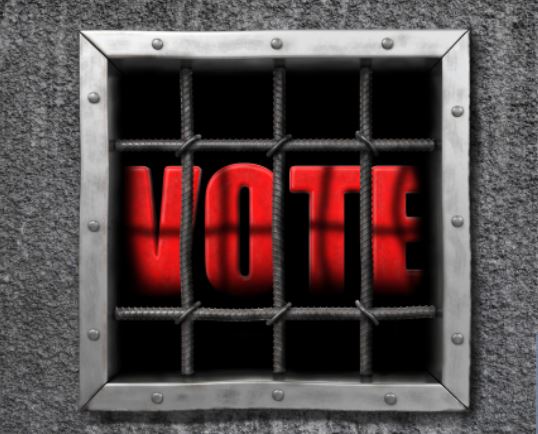[ad_1]
By Nicole Hanson and Qiana Johnson
The year 2020 marks the 100th anniversary of the passage of the 19th Amendment that guaranteed and protected most women’s constitutional right to vote. Importantly, it also marks 150 years since the 15th Amendment that granted Black and Brown men the right to vote. Since the passage of these amendments, civil rights leaders have fought to break down barriers and protect the right to vote for everyone regardless of their race, gender, or ethnicity. While there is much to celebrate, Marylanders continue the necessary work of expanding voting rights to all.
Disenfranchisement is alive and well in Maryland today.
Many of the nearly 12,000 state residents incarcerated in Maryland jails retain their legal right to vote but cannot exercise it. Eligible voters are incarcerated every day because they cannot afford to pay bail, are in pretrial detention, or are serving sentences for low level misdemeanor convictions—none of which makes them ineligible to vote. Maryland has largely failed to provide eligible voters with the resources to vote from jail and the ballot box is out of reach for these residents.

We should know. We are returning residents who were denied our voting rights while in jail.
Groups like Out 4 Justice and Life After Release are led by formerly incarcerated Marylanders. We are leading the effort to enfranchise eligible incarcerated voters because we believe those who are directly impacted by the criminal justice system are best equipped to reform it.
Now is the time to remedy this disenfranchisement and ensure thousands of eligible incarcerated voters can exercise their fundamental right to vote.
There is good news to report. We are working in Maryland on a solution. This session, Out 4 Justice and Life After Release are leading a campaign to provide access to voter registration forms and absentee ballots to eligible incarcerated voters. During the 2018 midterm election we actively educated residents on probation and parole in local jails on the electoral process, registered eligible voters and served as absentee ballot designees to ensure their ballot access.
We hope lawmakers enact pending legislation – HB 568/SB 372 – so voting rights for thousands of the state’s residents are protected. Maryland should lead the way.
Maryland would join several states moving voting reform for incarcerated voters. Most recently, Illinois lawmakers enacted legislation requiring eligible incarcerated voters be provided with voter registration forms and absentee ballots, and requiring counties with 3 million or more residents provide polling places in their jails. California passed voting in jail legislation back in 2016 and jurisdictions in Texas, Delaware, and Minnesota are considering similar reforms.
These proposed laws support meaningful ballot access and would require voter registration applications for persons in jail, absentee ballot applications, and information on how to vote.
Disenfranchising people in jail compromises public safety because most incarcerated residents will return home one day. In addition to basic supports like housing and food, participating in the electoral process supports reentry. It is among several pro-social activities that reinforce community connections known to reduce future justice involvement.
Marylanders should be proud that lawmakers are taking steps to protect voting rights for every state resident, even those in jail. In the meantime, we will continue to work with Maryland’s incarcerated residents in support of their reentry and well-being.
Our support and assistance are what we can offer to welcome formerly incarcerated residents home and help them to not return to jail. Now, it is time for Maryland’s lawmakers to do their part. Protect the vote for incarcerated Marylanders who are eligible to vote: pass the HB 568/SB 372 to expand the vote.
Nicole Hansen is the executive director of Out For Justice and Qiana Johnson is executive director of Life After Release.
[ad_2]
Source link

